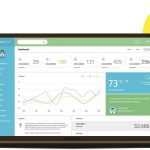There are about 6,000 sensors on an A350 aeroplane. The average Airbus flight generates 2.5 petabytes per flight with over 100,000 flights per day! Industrial Internet of Things, or IIoT, is a massive market. It includes aeroplane and car manufacturers, power plants, oil rigs, and assembly lines, all of which contain sensors measuring thousands of different attributes. But … [Read more...] about How Industrial IoT is Influenced by Cognitive Anomaly Detection
Big Data
Learn everything you need to know about big data. Find out how companies are using this revolutionary technology and what it means for your business strategy.
3 Essentials for Using Big Data for Financial Forecasting
At this point, big data's impact on the way companies operate is no longer up for debate. Proving itself to be a key player in everything from marketing to retail, big data's prevalence in business grows every day. Information about exactly how populations spend their time and money is more available than ever before, and it's up to individual companies to decide how they want … [Read more...] about 3 Essentials for Using Big Data for Financial Forecasting
5 Tips for Making the Most Out of Your Company’s Data Center
A company's data center often serves as the heart of the organization. It's the center of everything and, for better or worse, has a direct impact on just about every area of the business. If you aren't paying attention to both the big picture issues and finer details of your data center, then you probably aren't maximizing its value. 5 Tips to Help You Manage Your Data … [Read more...] about 5 Tips for Making the Most Out of Your Company’s Data Center
How Big Data Sector Changed the Banking Sector
Unlike the early days when everything was done manually, these days the evolution of technology has changed how different sectors perform. One of those industries that have been impacted by the growth in technology is the banking industry. During the early days, the sector handled communication manually which greatly limited the sector. It was difficult for the financial … [Read more...] about How Big Data Sector Changed the Banking Sector
Rogue Data in the Present, Internet Regulation in the Future
Data gone AWOL ” According to DeVry, it's one of the top cybersecurity threats that could end up affecting your life. As it turns out, it may already have. Recent revelations that Trump-hired political marketing firm Cambridge Analytica illegally harvested user data from Facebook to influence the 2016 US elections has shocked the world, but the Washington Post reports that it … [Read more...] about Rogue Data in the Present, Internet Regulation in the Future
What is big data?
Big data is a term that refers to the massive amount of digital data created and shared every day. Big data can transform how we live, work, and communicate. It can be used to improve everything from public health and urban planning to business and marketing.
Big data is also changing the way we think about privacy and security. The volume, velocity, and variety of big data present challenges and opportunities for organizations and individuals. Regardless, big data is here to stay, and its impact will only continue to grow in the years to come.
What is big data analytics?
Big data analytics is the process of turning large, complex data sets into actionable insights. Businesses use various analytical tools and techniques, including machine learning and statistical analysis, to do this.
Big data analytics can be used to improve decision-making in areas like marketing, operations, and customer service. It can also be used to identify new business opportunities and optimize existing processes. With the help of big data analysis, businesses can gain a competitive edge by using their data better.
Want to learn more about big data? Datafloq has courses available. Contact us to get started.
When was big data introduced?
The term big data was coined in the 1990s, with some giving credit to John Mashey for popularizing the term. However, the concept of big data has been around for much longer.
Where does big data come from?
In the early days of computing, scientists and businesses began to realize that the amount of data being generated was increasing exponentially. As a result, they began to develop new methods for storing and processing data.
Over time, these methods have become increasingly sophisticated and have played a key role in enabling businesses to make sense of vast amounts of information. Today, big data is used in various industries, from retail to healthcare, and its importance is only likely to grow in the years to come.
What are examples of big data?
One of the most common examples of big data is social media data. With over 2 billion active users, Facebook generates a huge amount of data every day. This includes information on user interactions, posts, and even location data. Analyzing this data can help companies better understand their customers and target their marketing efforts.
Another example of big data is GPS signals. These signals are constantly being generated by devices like cell phones and fitness trackers. When combined with other data sets, GPS signals can be used to provide insights into everything from traffic patterns to human behavior. Finally, weather patterns are another type of big data set. By tracking these patterns over time, scientists can better understand the impact of climate change and develop strategies for mitigating its effects.
How do companies use big data?
Companies use big data in marketing, product development, and customer service. By analyzing large data sets, businesses can identify patterns and trends that would be otherwise difficult to spot. For example, a company might use big data to track customer behavior patterns to improve its marketing efforts.
Alternatively, a company might use big data to improve its products by identifying areas where customers are most likely to experience problems. For instance, big data can be used to improve customer service by finding pain points in the customer journey. Ultimately, big data provides companies with a valuable tool for gaining insights into their business operations.






